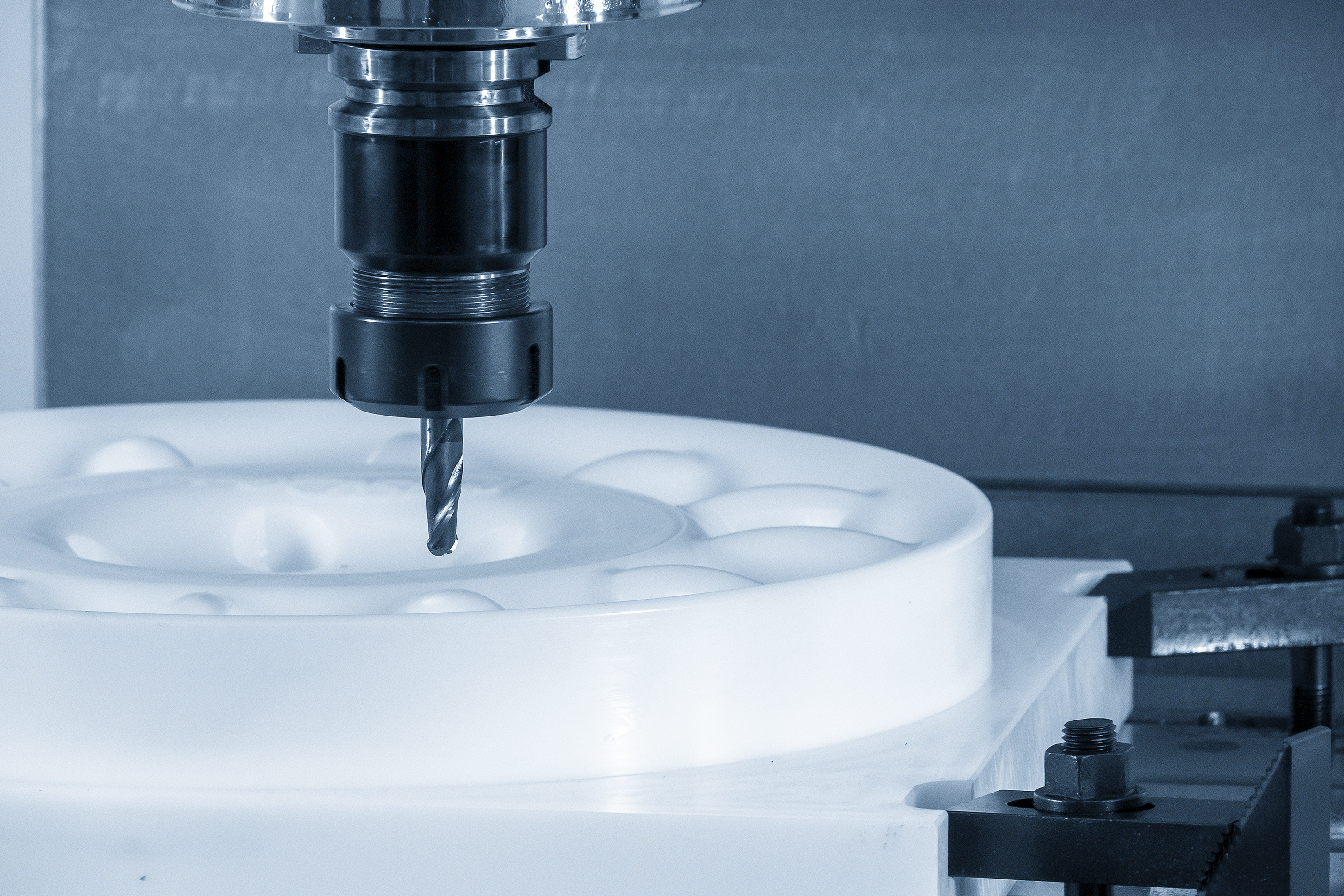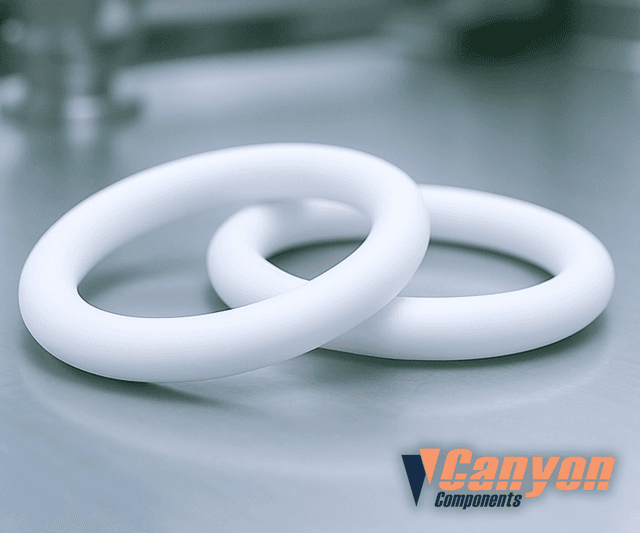
Micro O-rings - Sealing at Scale
Micro O-rings are miniature sealing components designed for applications where space is limited, but reliable sealing is essential. These tiny seals are used in various industries, from medical devices to electronics, where precision and performance are critical. This guide explores the features, common applications, and the pros and cons of using micro O-rings in your systems.
CanRez® FFKM and Kalrez® micro O-rings, micro gasket rapid manufacturing, & custom molded parts are available now!
Check with one of Canyon’s helpful product engineers for an expert material and manufacturing recommendation.

Features of Micro O-Rings
Micro O-rings offer several distinct features that make them ideal for specialized applications:
- Miniature Size: Micro O-rings are designed to fit into very small spaces, making them suitable for applications with tight tolerances and compact designs.
- Precision Sealing: Despite their small size, micro O-rings provide reliable sealing for both static and dynamic applications, preventing leaks and contamination.
- Material Versatility: Micro O-rings are available in various materials, including Nitrile, Silicone, EPDM, and Fluorocarbon, allowing them to be tailored to specific chemical and temperature requirements.
- High Durability: These O-rings are engineered to withstand demanding conditions, including exposure to chemicals, temperature fluctuations, and mechanical stress.
Common Applications of Micro O-Rings
Micro O-rings are used in a wide range of industries where small-scale sealing is essential. Common applications include:
- Medical Devices: Micro O-rings are commonly used in medical equipment such as syringes, pumps, and diagnostic devices, where precise sealing is critical for patient safety.
- Electronics: In electronic devices, micro O-rings provide sealing and insulation in components such as connectors, sensors, and microfluidic systems.
- Aerospace: Micro O-rings are used in aerospace systems where lightweight, compact seals are required to maintain performance in extreme conditions.
- Automotive: In automotive applications, micro O-rings are used in fuel injectors, sensors, and other components where space is limited, and reliable sealing is necessary.
- Watchmaking: Micro O-rings are used in watches and other precision instruments to provide water resistance and protect internal components.
Please consult a Canyon Components Engineer about your specific application and we will use our decades of experience to formulate a solution that fits your need.
Get a Quote Now!

Types of Micro O-Rings
CanRez® FFKM Perfluoroelastomer
Extreme temperatures & chemicals require extreme solutions! CanRez® FFKM micro O-rings and materials offer extreme reliability where you need it most! Thousands of sizes in stock now!
CanGuard™ RFI & EMI Shielding Materials
CanGuard™ materials have been developed to offer superior sealing solutions with enhanced electromagnetic interference (EMI) shielding and radio frequency interference (RFI) shielding in a micro O-ring format.
Kalrez® FFKM Perfluoroelastomer
Canyon Components offers Kalrez® Perfluoroelastomer (FFKM) micro O-rings, gaskets, & custom molded parts at competitive prices and with great lead-times.
Parker® O-rings, Parofluor parts, parker FKM Viton
Canyon Components offers Parker Hannifin® micro O-rings, Gaskets, Perfluoroelastomer (FFKM) parts, & custom molded parts at competitive prices and with great lead-times.
FKM (Viton®, Fluorocarbon)
FKM compounds, micro O-rings, gaskets, & custom molded parts exhibit excellent mechanical attributes as well as excellent resistance to high temperatures, mineral oil, ozone, fuels, hydraulic fluids, and many other solvents and chemicals.
Aflas® (TFE/P)
TFE/P (Aflas) compounds, micro O-rings, gaskets, & custom molded parts gives high resistance to steam, hot water, atmospheric wear, and many chemicals. TFE/P compounds provide superior performance in water, steam and virtually all caustic chemicals.
Fluorosilicone (FVMQ)
The mechanical and physical properties of Fluorosilicone micro O-rings, gaskets, & custom molded parts are very similar to silicone. Fluorosilicone O-rings, gaskets, & custom molded parts offer improved flexibility and strength, better resistance to fuels and mineral oil, but reduced hot air resistance.
Silicone (VMQ, PVMQ)
Silicone seals, micro O-rings, gaskets, & custom molded parts are excellent for extreme temperatures in static applications. Canyon Components carries a range of silicone materials, and we are happy to custom tailor a seal to meet your application requirements!
EPDM (Ethylene Propylene)
EPDM materials, micro O-rings, gaskets, & custom molded parts can operate over a wide temperature range, and are compatible with glycol fluids that cause problems for most typical elastomeric seals.
NBR (Nitrile, Buna-N)
Nitrile micro O-rings, gaskets, & custom molded parts are very oil-resistant, have strong mechanical properties, are resistant to wear, and are relatively inexpensive. These properties make Nitrile the most commonly used general purpose O-ring, gasket, & custom molded part material.
HNBR (Hydrogenated Nitrile)
Hydrogenated Nitrile micro O-rings, gaskets, & custom molded parts offer higher strength and reduced degradation at high temperatures compared to conventional Nitrile materials. These properties make HNBR materials popular in the oil and gas industry, as well as many applications in the chemical industry.
XNBR (Carboxylated Nitrile)
XNBR micro O-rings, gaskets, & custom molded parts are similar to Nitrile, but the backbone has been chemically modified with a Carboxylic Acid group. The resulting elastomer is a Nitrile rubber with outstanding abrasion and chemical resistance, superior to that of traditional Nitrile.
Neoprene (CR)
Chloroprene was the first synthetic rubber, and was developed commercially under the name Neoprene®. Chloroprene rubbers, micro O-rings, gaskets, & custom molded parts contain Chlorine in the polymer to reduce the reactivity to many oxidizing agents, as well as to oil and flame.
Polyurethane (PU, AU)
Polyurethane micro O-rings, gaskets, & custom molded parts generally have two or three times greater tensile strength and wear resistance than Nitrile and comparable polymers. Polyurethane also provides excellent permeation resistance when compared to most rubbers.
PTFE O-Rings
The harshest environments require specialized solutions. Often times, a Canyon Components PTFE micro O-rings are used in harsh chemical environments. Polytetrafluoroethylene, commonly known as PTFE or Teflon®, is a high-performance fluoropolymer known for its exceptional chemical resistance, low friction, and non-stick properties.
Product Types
Custom Parts
Here at Canyon Components, we make sure to offer our customers any manufacturing technique they desire. Whether your micro O-rings, gaskets, & custom molded parts be rubber, plastic, or metal, rest assured that Canyon Components can make it!
Gaskets & Custom Cutting
Whether your custom cut parts be rubber, plastic, sponge, composite, or metal, rest assured that Canyon Components can make it! Canyon Components strives to meet all customer service requests. If you need something that isn't listed, feel free to contact a Canyon Components product and application consultant.
Infinite "Giant" Diameter O-Rings
By either Continuous Molding O-rings, or Splice & Vulcanizing O-rings, Canyon can provide mold-less, infinitely large O-rings at competitive prices!
Specialty Compliances
Canyon have materials available for micro O-rings, gaskets, & custom parts with compliances ranging from USP Class VI <87> & <88> for medical applications, to FDA CFR 21.177.2600 grades A through F for different food types, to the various drinking water specifications like KTW and NSF. Whether it's metal, rubber, or plastic, Canyon can meet your needs!
Please consult a Canyon Components Engineer about your specific application and we will use our decades of experience to formulate a solution that fits your need.
Micro O-rings Pros & Cons
Micro O-rings are essential components in applications where space is limited, but reliable sealing is critical. Their miniature size, precision, and material versatility make them ideal for industries such as medical devices, electronics, aerospace, and more. However, the complexity of manufacturing, handling, and potential limitations in load capacity should be considered when selecting micro O-rings for your application. By understanding their features, applications, and potential drawbacks, you can make informed decisions to ensure optimal performance in your systems.
Canyon Components strives to meet all customer service requests. Feel free to contact Canyon Components engineering and let our knowledgeable staff help you design the perfect part for your needs.
Pros of Micro O-Rings
Micro O-rings offer several advantages that make them a valuable choice for precision sealing applications:
- Space Efficiency: Their small size allows them to be used in compact designs where traditional seals would be too large or bulky.
- Precision: Micro O-rings provide reliable sealing in applications where even small leaks can lead to significant problems.
- Versatility: Available in various materials, micro O-rings can be customized to meet the specific demands of different environments and applications.
- Durability: Despite their size, micro O-rings are designed to withstand harsh conditions, providing long-lasting performance in critical applications.
Cons of Micro O-Rings
While micro O-rings offer many benefits, there are also some potential drawbacks to consider:
- Manufacturing Complexity: The production of micro O-rings requires precision manufacturing processes, which can increase costs and lead times.
- Handling Difficulty: Due to their small size, micro O-rings can be challenging to handle, install, and inspect, requiring specialized tools and techniques.
- Limited Load Capacity: Micro O-rings may not be suitable for applications that require high load-bearing capacity or significant mechanical stress, as their small size limits their strength.
- Customization Needs: Depending on the application, micro O-rings may need to be custom-designed, which can increase costs and complexity.
Back to Products Hub

Get A Quote Now!
















